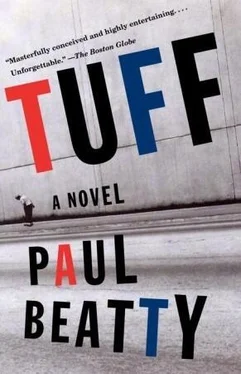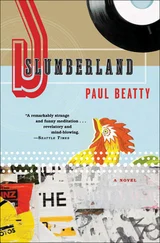“The mohel will see you now,” the nurse said, guiding Spencer down a dim corridor lit with buzzing and blinking fluorescent tubes.
“Relax, my friend. I’m Mr. Epstein.” Mr. Epstein’s breath smelled of gin and lime, and to Spencer’s disappointment, he was clean-shaven. Spencer had pictured a man with an Eastern European accent and a full beard. With a callous, ungloved hand Mohel Epstein tugged on Spencer’s penis as if he were ringing a church bell. “Oww!”
“You’re penile sensitive — we’ll use the anesthesia.” Mohel Epstein peeled back Spencer’s foreskin and took a sip of his drink. “A bit of smegma buildup — Nurse Lacey, the novocaine.” Mohel Epstein plunged the needle into the tip of Spencer’s penis, and the last thing Spencer felt was Epstein stenciling a very crooked line around what he called the “turtleneck” of his penis.
As a blindfolded Spencer groped his way into the van for the return trip, he felt Epstein place a hand on top of his head. “Hold up a second, son, you need a name. Henceforth, you shall be known by the Hebrew name of Yitzhak.” Spencer was disappointed, having hoped for a short, sporty three- or four-letter name: Ari, Zev, Seth. He’d never known a Seth who wasn’t cool.
For the next two weeks, Hadar treated Spencer like a wounded war veteran come home. She cooked, sang, and teased him into painful erections. One night she drew a pair of dark sunglasses on the white gauze bandage that covered his dick head, playfully addressing Spencer as “Yitzhak, the invisible penis.” On unveiling day, Hadar unwrapped the bandages. Instead of saying “ta-dah” and welcoming Spencer’s new penis into the world with a little fellatio, Hadar covered her mouth to stifle a scream and ran out of the bedroom sobbing. Spencer examined his new member. His dick looked as if it had been mutilated by a broken grade-school sharpener. He vainly tried to blow and brush away the corkscrew bits of scar tissue from his penis as if they were wood shavings. “Not to worry, honey — it’s just a little bruised, is all.”
Despite the newfound carnal pleasures she received from Spencer’s penile mangling, Hadar left him at the end of the summer. “You’re too Jewish,” she explained, leaving him to a pile of law-school rejection letters.
As a result of his conversion efforts, Spencer’s grades had dropped so dramatically that despite his skin color and his ability to pay for three years of graduate education without financial assistance, he couldn’t get admitted to even the chintziest law schools. Spencer thought of appealing the decisions but knew no admissions board in the country would be willing to acknowledge the mind-numbing rigors of a black male in an interracial relationship. “But you don’t understand, dating a white girl is an extracurricular activity!”
Not wanting to waste his conversion, Spencer moved to New York and enrolled in Hebrew Union’s rabbinical program. Four years later he graduated, second-to-last in his class, and with one job prospect—“kosherizing” the steers in a slaughterhouse in Ames, Iowa. Turning down the offer, Rabbi Throckmorton supplemented his modest trust fund by guest-lecturing at the more liberal synagogues. His most popular address was entitled “The Ignored Indispensability of Jewish Support for African-American Politics and Art Forms: Without the Observers of Shabbat There’d Be No Martin Luther King Mountaintop, Bebop, Hip-hop, or Bad Shakespeare Productions.” Soon word of the existence of a hip young rabbi “who just happens to be black” spread. Spencer obtained notoriety as a freelance rabbi, speaker, and journalist, and New York City’s leading Jewish and secular publications, mistaking his innocuousness for intelligence, competed for his services. Spencer was the only black friend of many of the city’s political organizations. And since there was only one degree of separation between him and the Manhattan activists, but an immeasurable distance between them and the rest of mysterious black America, officers of various organizations would ask Spencer to recommend like-minded and like-tempered black folks for those high-paying display-window positions for which qualified black candidates were invariably hard to find. “Rabbi Throckmorton, do you know any black people qualified to head up our financial department in Milwaukee? Remember, they must be smart as a whip.” No one ever called Spencer looking for qualified white candidates who were smart as a whip, or even fellow Jews who were dumb as a doorknob; but he didn’t mind so long as they called.
Spencer’s junket to East Harlem was no altruistic act. The trust fund was petering out, and Spencer was on assignment, as one of the few black writers who, as his African-American editor at a local paper put it, “possess a command of the language that most of us don’t have. Can describe the perverse ghetto mentality in a vernacular familiar to our readers. Doesn’t write in music-magazine expletive.” Spencer had been shocked by his editor’s elitist banter, but the banknote on the condominium was due, and with a gracious smile he played along. “I’m just keeping it real, homeboy.”
Having schmoozed up the editor, he pitched an idea for a Sunday feature, using the tried-and-true derisive-article-about-minorities-written-by-a-minority approach. “Let’s capitalize on the city’s decreasing crime rate,” he said, straightening his tie to convey his seriousness and urbanity. “My sense is that your readership wants reassurance that this drop is more than just a lull. They’re seeking a guarantee that the criminal element — and let’s be frank, I mean the feral African-American and Hispanic youth, and one or two Italian boys — isn’t in hibernation like locusts awaiting nature’s signal. Who’s to say that one day without warning the hatchlings won’t swarm and devour the city?”
The editor tilted back in his chair, thumbs linked under his suspenders. “A CAT scan of the sleeping giant. It’s a bit alarmist — where’s the human interest angle?”
“A sidebar on the history of African-American paedogenesis.”
“Big-bellied black girls — always good fodder for the editorial page. But what makes you think you’ll be able to mingle with the nitty-gitty element? Blend in and become one of the gang?”
Spencer hunched his shoulders, folded his arms tightly across his chest, and delivered a line of classic hip-hop meter, laying out the verse as if he were a tap dancer challenging another hoofer to match a complicated step:
I’ll take seven MCs
Put ’em in a line
Add seven more brothers
Who think they can rhyme .…
The editor, taking his cue like a pro, finished the verse off like a Japanese court poet exchanging haiku with Bashō.
Well it’ll take seven more
Before I go for mine .
Now that’s twenty-one MCs
Ate up at the same time .
“You’re good, Throckmorton. You’re very good.”
Two stern-faced teenage boys flanked the entrance to 291 East 109th Street. Studies in asymmetry, each lad sported a single pant leg hiked up to knicker height, exposing a thin calf lotioned to a mahogany sheen, one earring, one nose ring, and one shaved eyebrow. To further the sense of fashion imbalance, the taller kid’s T-shirt read, I AIN’T GOT TIME FOR NO FAKE NIGGAS, and the other’s shirt said, I LOVE BLACK PEOPLE, BUT I HATE NIGGAS.
Spencer felt his world listing. “Hello, boys.” He raised his arms like a shaky gymnast on a balance beam and the wooziness abated. “Your shirts bespeak a bit of a familiar paradox. The quest for the real nigger within us, and the simultaneous hatred for that selfsame nigger as other. As in ’I’m a real nigger, but I hate all other niggers who aren’t like me in ways that fit my idiosyncratic perception of essentialist niggertude.”
Читать дальше












